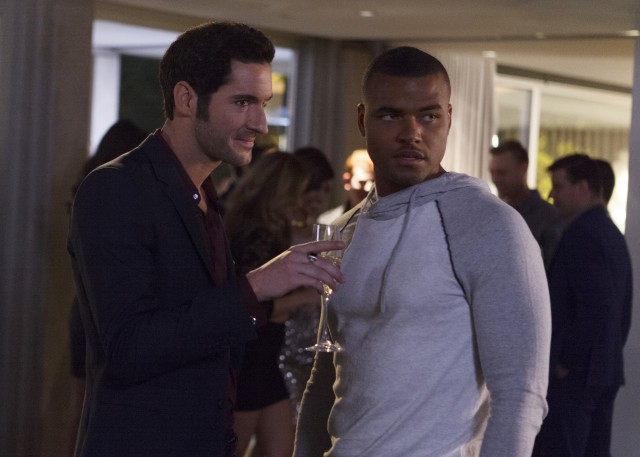
It’s unfortunate the titular topic of Lucifer‘s third episode – that is, Lucifer’s rejection of his own reign in Hell – is relegated to but a few scenes, surrounding by yet another tepid, vaguely racist (and misogynist) story about an overeager/paranoid sports agent and an obsessive girlfriend. The four or five minutes Lucifer doesn’t spend staring through people or offering up sexual innuendo are the first genuinely compelling moments of Lucifer so far; unfortunately, everything around it in “The Would-Be Prince of Darkness” suggests its interest in Lucifer’s self-transformation are more superficial than anything else.
First of all, how the show tries to connect his “reinvention” (which isn’t really a reinvention; in this version of Lucifer, he simply abandons Hell so he can be the Devil without any of the responsibility or commitment) to his supposed attraction to Chloe is just silly. On every other occasion, Lucifer seems to believe human emotion is something to be toyed with; and that just makes for a more fun character than the Grinch Realizing His Heart is Beating story, dragged out over the course of an entire season’s worth of horribly written crime stories (how about Chloe arresting the first guy she sees at the crime scene for murder?). Obviously this version of Lucifer Morningstar is an intentionally unique entity from his comic book origins; but Lucifer seems to want to have both, suggesting at the deeper elements of Gaiman’s creation for the sake of drawing in comic book fans, only to reveal the emptiness of the references with the thinner character they’ve created for television.
It’s why I don’t particularly feel confident about the intriguing final scene; Dr. Linda Martin might be the show’s most interesting character, the only woman willing to recognize Lucifer for who he is, and wholeheartedly accept it (while also finding fascination in him psychologically; Chloe just finds him empty and annoying, which makes their interactions a lot more flat and predictable). Dr. Martin challenges Lucifer on who he is, and why he’s in Los Angeles; and that’s a lot more fascinating than watching him tell Chloe how much smarter he is than her, committing felonies on ridiculously overwrought crime cases for forty minutes a week. I’m not suggesting this become the Dr. Martin Therapy Hour, but her scenes offer insight into the protagonist in a way no other character can possibly approach (the loyal Mazikeen and angry Amenadiel are too one-note), in a way that almost feels Hannibal-esque (arguably the highest compliment I’ll ever give this show).
Using those moments as a gateway for story, rather than a closing tag that acts as a tease more than a meaningful development, would begin to enrich Lucifer‘s characters – and if we’re being honest, that’s where this show is failing the most. At times, it feels like the writers don’t even like Chloe, and characters like Dan and Mazikeen just kind of float around in the background, pounding away at the one aspect of personality they’ve been offered in their first few episodes; and with such a loose, often-contradictory grip on Lucifer’s sense of self-perception, the people inhabiting the Los Angeles of Lucifer just feel empty. Having terrible procedural stories also plays into this, but often, great characters will supersede silly material, and liven up an otherwise perfunctory, by-the-numbers “edgy” crime drama (that is, there are minorities and possibly drugs involved, with a white girl paying the “ultimate” price). With its rampant refusal to really dig into Lucifer’s obsession with Allie’s murder until the final minutes, Lucifer consistently sells its main character short; that dissonance drowns out every other character, and ultimately reduces “The Would-Be Prince of Darkness” into another silly, one-dimensional exercise in predictable, mediocre storytelling.
Other thoughts/observations:
- It’s annoying how half this episode is spent going in a circle; after arguing with Chloe that the football player isn’t guilty because Lucifer doesn’t feel it, he later becomes inspired when he realizes (and I quote) “I punish the guilty, and he’s not guilty!” It took about ten minutes to circle back around to that point, and everything in between felt like a waste of time (it was the writers having the killer lie to the detectives, of course).
- Lucifer doesn’t care about anyone impersonating him – until his sexual reputation is on the line. I really wish this version of Lucifer was a little less self-obsessed.
- a girl crying in an ice cream shop for three hours over a boy is both 1) something this episode treats as a real thing, and 2) treats as an absolute joke.
- Who calls blackmail a “number 3 special”? Ronnie was not quite the sexy, electrifying characters the writers thought she would be.
 Follow Us
Follow Us





